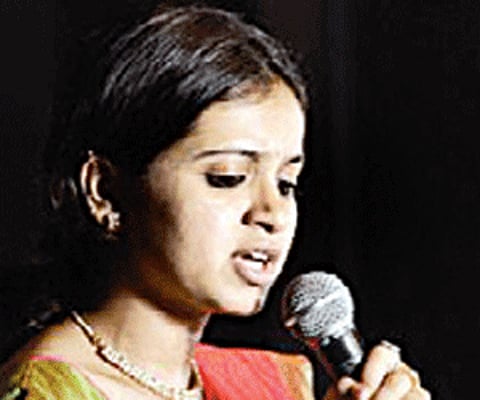

Saraswathi Gana Sabha and Sree Guruvayurappan Bhajan Samaj Trust will present their monthly music concert by Varijashree, Srinidhi R Mathur, C Cheluvaraju and Sukanya Ramgopal at Unnati Centre No.
1, Ganesha Temple Road, NGEF Layout, Sadananda Nagar from 10.30 am to 1 pm on October 16.
Varijashree is a child prodigy and daughter of Vidwan HS Venugopal and T V Rama.
She was found to have the rare ability to identify about 40 ragas at the tender age of one and a half and about 200 ragas at the age of four.
This ability was recognised by her parents and she was initially trained by her father in Carnatic music and went on to undergo formal training in music under Vidushi H Geetha at the age of four.
At present she is learning higher music lessons under the tutelage of Gaanakalanidhi Vidwan Salem P Sundaresan.
She has also been undergoing flute training under her father for the past two years.
Varijashree has performed at many places all over India.
She has been very much appreciated by critics and music lovers alike.
Varijashree has been rewarded with awards and titles by many institutions of which Ananya Pratibhe, 2010 and Ananya Naadajyoti Yuva Puraskar, 2010 are included.
She has music albums Arpana and Upasana and Mela raga malika to her credit.
She has scored music for the documentary film, Ashtaavadhaana directed by Shataavadhani Dr R Ganesh and produced by Abhinaya Bharathi.
She has been honored with various titles and honours.
Gana Vinodhini (Sri Ramakrishna Sharadha Samitihi Colombo), Kempegowda Award (Bangalore City Corporation), Vidhya Rathan (Shubaram Trust) and Pearl of Bangalore (Bangalore Chapter of Jaycees).
She has been felicitated by Nadha Brahma Sabha (Mysore) and by ASTRA-IDL, a corporate body in Bangalore.
Like all art forms in I n d i a n culture, Carnatic music is believed to have a divine origin.
It originated from the Devas and Devis (Hindu Gods and Goddesses), and is venerated as symbolic of nada brahman.
Ancient treatises describe the connection of the origin of the swaras, or notes, to the sounds of animals and birds and man’s effort to simulate these sounds through a keen sense of observation and perception.
The Sama Veda, which is believed to have laid the foundation for Indian classical music, consists of hymns from the Rigveda, set to musical tunes which would be sung using three to seven musical notes during Vedic yajnas.
The Yajur-Veda, which mainly consists of sacrificial formulae, mentions the veena as an accompaniment to vocal recitations.
References to Indian classical music are made in many ancient texts, including epics like the Ramayana and Mahabharata.
The Yajnavalkya Smriti mentions The one who is well versed in veena, one who has the knowledge of srutis and one who is adept in tala, attains salvation without doubt.
Carnatic music is based as it is today on musical concepts (including swara, raga, and tala) that were described in detail in several ancient works, particularly the Silappadhikaram, and Bharatanatyam’s shastra.